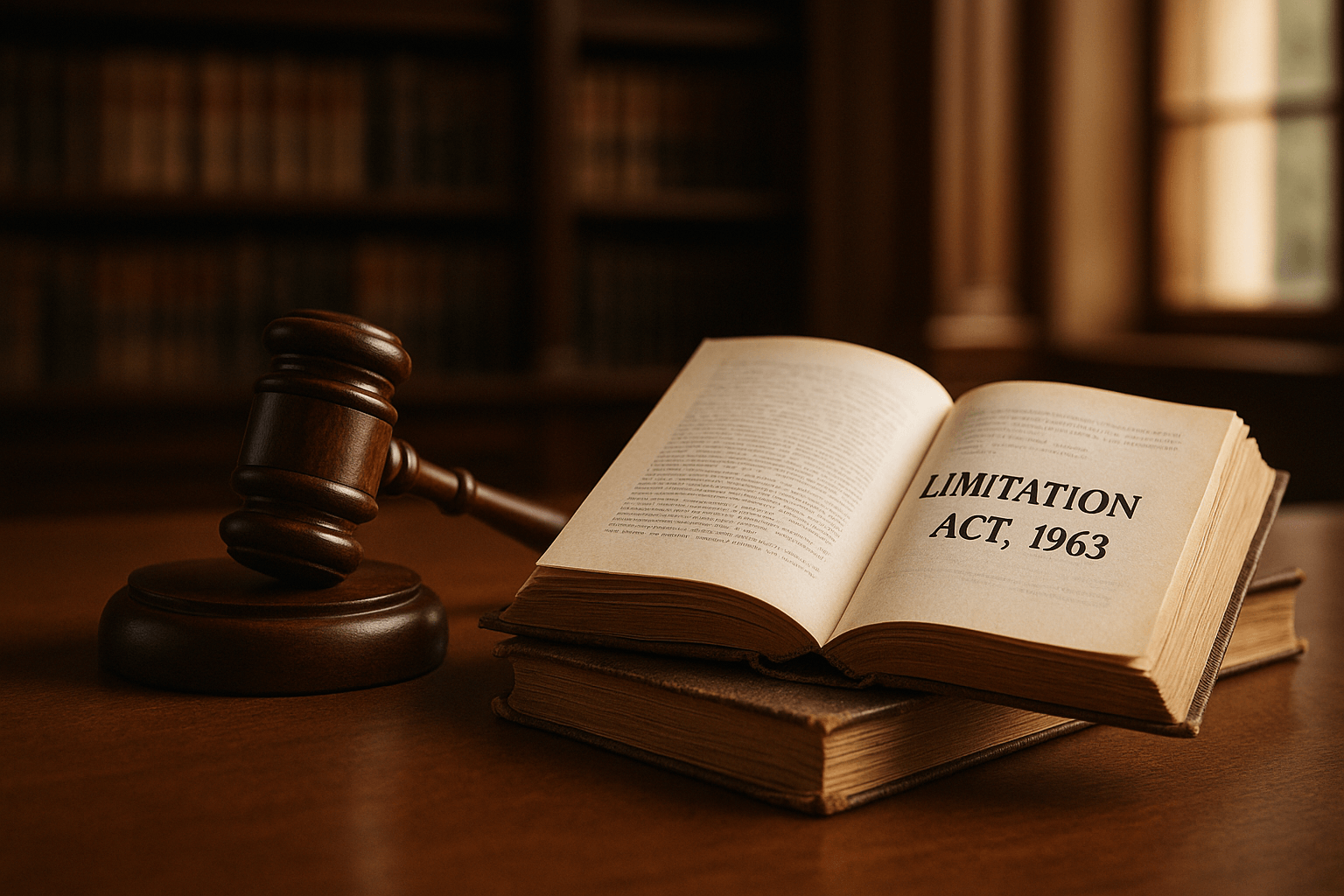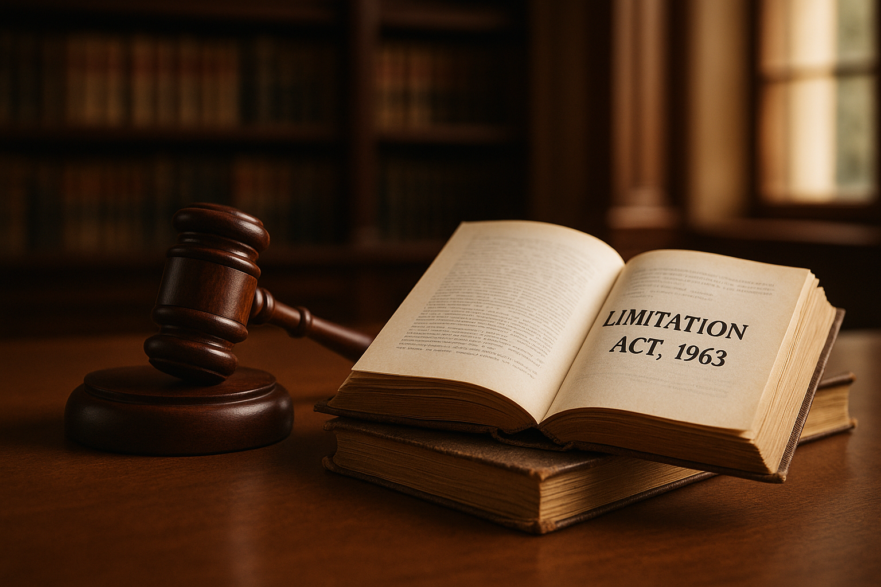
📜 SUPREME COURT ON SECTION 12(2) LIMITATION ACT
Delhi Law Academy Jaipur presents below for aspirants of Rajasthan Judicial Service (RJS), DJS, PCS (J) and other Judicial Services throughout India a very important judgment of the Supreme Court of India explaining the essential ingredients of section 12(2) of the Limitation Act.
⚖️ UDAYAN CHINUBHAI V. R.C. BALI [1977 SC]
J U D G M E N T
The plaintiff-respondent filed a suit for rendition of accounts in the court of the Commercial Sub-Judge; Delhi and he decreed the suit by his judgment dated March 27, 1976, in the following words:
I grant the plaintiff a final decree in the sum of Rs. 42,259.75 against the defendants. The plaintiff is directed to make up deficiency in court-fee within one month.
It appears that the suit was filed with a court-fee of Rs. 20 only. The plaintiff after obtaining, from the court, an extension of time supplied the deficient court-fees on May 6, 1976, on which date the decree was prepared and signed.
Advocate made an application for certified copies of the judgment and the decree on April 17, 1976. Later on the appellant requested Shri P.H. Parekh, another Advocate, to file the appeal in the High Court.
Shri Parekh filed another application for certified copies of the judgment and decree on July 14, 1976, after signing of the decree. The said copies were ready on September 17, 1976 and were received by Shri Parekh on that day. Shri Parekh prepared the Memo of appeal, got it approved from his client in Ahmedabad, and filed the appeal in the High Court on September 29, 1976.
We would not approve of reading the words in the Explanation “shall not be excluded” by mentally substituting them as “shall be included” for the purpose of construction. There is a scheme underlying the several clauses in Section 12 along with the Explanation which is the opening section in Part III of the Act under the title “Computation of period of Limitation”. Sub-clauses (1), (2), (3) and (4) use the same expression “shall be excluded” for the purpose of computing the period of limitation. Whenever, therefore, under Section 12 a prescribed period of limitation has to be computed certain days are permitted to be excluded in order that a person who desires to appeal is not put to any inconvenience or hardship in the prescribed period being shortened by certain exigencies for no fault of his or for reasons beyond his control.
When in the several clauses of Section 12, as mentioned above, certain days shall have to be excluded, what is not to be excluded, therefore, has also to be clearly explained. That is the raison d’être for the Explanation newly introduced. In the entire scheme of Section 12 dealing with exclusion of time for the purpose of computing the prescribed period of limitation, it is not possible to substitute the words “shall not be excluded” by reading the same as “shall be included” which will introduce an alien concept which is different from that disclosed in the setting of all the provisions. The words “shall not be excluded” in the Explanation have to play an appropriate role in the setting and context of the expression “shall be excluded” used in all the preceding clauses in Section 12.
Having thus in the above three clauses excluded a number of days in computing the prescribed period of 90 days, it was absolutely necessary to make it clear in the Explanation that the time taken by the court to prepare the decree before an application for a copy thereof is made shall not be excluded.
Computation of limitation is predominantly the governing factor in Section 12. As if the section and the Explanation say: You are permitted to exclude the time requisite for obtaining a copy but in computing that time, which is requisite and which is allowed for exclusion under Section 12(2), you shall not exclude, while computing the period of limitation, the time that had elapsed from the date of judgment to the date of your application for a copy. The object seems clearly to be not to give premium to unmerited idleness and indifference of litigants in making application for copy.
The correct legal position, therefore, is that under Section 12(2) read with the Explanation a person cannot get exclusion of the period that elapsed between pronouncement of the judgment and the signing of the decree if he made the application for a copy only after preparation of the decree.
While the above is the true legal position that emerges from Section 12(2) read with the Explanation there may be an exceptional case, as the instant one, before us. The time requisite for obtaining a copy under Section 12(2) must be that time which is “properly required” for getting a copy of the decree. It is not possible to conceive how a person may obtain a copy of a decree if that decree, in view of the recitals in the judgment pronounced, cannot be prepared without some further action by a party. A judgment which is unconditioned by the requirement of any action by a party, stands on a different footing and in that event the date of the judgment will necessarily be the date of the decree. In such a case, a party cannot take advantage of any ministerial delay in preparing the decree prior to his application for a copy, that is to say, if there is no impediment in law to prepare a decree immediately after pronouncement of the judgment, no matter if, in fact, the decree is prepared after some time elapses. No party, in that event, can exclude that time taken by the court for preparing the decree as time requisite for obtaining a copy if an application for a copy of the decree has not been made prior to the preparation of the decree. It is only when there is a legal impediment to prepare a decree on account of certain directions in the judgment or for non-compliance with such directions or for other legally permissible reasons, the party, who is required to comply with such directions or provisions, cannot rely upon the time required by him, under those circumstances, as running against his opponent.
When a judgment is delivered in the presence of the parties clearly announcing certain steps to be taken by the plaintiff before the decree can be prepared, the matter stands on an entirely different footing. In the present case without deposit of the deficient court-fees by the plaintiff the decree could not be instantly prepared under the law. Time was given to the plaintiff for that purpose and there could be no decree in existence in law until the plaintiff supplied the court-fees. Without the existence of the decree any application for a copy of the decree would be futile.
Therefore, on the facts of this case, in view of the operative part of the judgment, the date of the decree was when the plaintiff furnished the court-fees as ordered. It was only then for the first time possible to prepare the decree in terms of the judgment. In this case the decree was prepared on the very day, namely, May 6, 1976, when the court fees were furnished by the plaintiff. It would have been “extravagant” for the appellant to apply for a copy of the decree before the decree could be prepared. On the special facts of this case there was no default on the part of the appellant and the appeal was not barred by limitation. The respondent cannot take advantage of his own default to defeat the appellant’s appeal on the ground of limitation. The period of 90 days, in this case, will count from the date when the plaintiff had deposited the court-fees, as ordered, when only the court could take up the preparation of the decree. It is not a case of the court omitting or delaying to prepare the decree without any further action by a party.
* * * *
📘 Free Study Material for Judiciary Aspirants!
Download our FREE study material prepared by Delhi Law Academy’s expert faculty.
❓ FAQs: Section 12(2) Limitation Act & Udayan Chinubhai v. R.C. Bali
Section 12(2) of the Limitation Act deals with the computation of the period of limitation and provides for exclusion of certain days while computing limitation. It ensures litigants are not disadvantaged due to delays beyond their control, like waiting for certified copies of decrees.
The Court clarified that the time between pronouncement of the judgment and signing of the decree cannot be excluded if the application for a copy is made only after preparation of the decree. The period for appeal starts once the decree is prepared.
Yes, but only if a legal impediment exists. If no action by a party is required and the decree could be prepared immediately, ministerial delay cannot be excluded. Exclusion is for delays beyond the control of the litigant.
The Explanation clarifies that the time taken before an application for a copy of the decree is made shall not be excluded, preventing litigants from gaining an unfair advantage by delaying their application for a copy of the decree.
It establishes that the limitation period for filing an appeal starts when the decree is legally prepared. Any delay in obtaining certified copies after the decree is prepared can be counted for exclusion, but delays before decree preparation are not counted.
This judgment is crucial for RJS, DJS, PCS(J) aspirants to understand the practical computation of limitation under Section 12(2). It emphasizes correct legal interpretation, exclusion rules, and procedural nuances for appeals.
Contact us
📍 Delhi Law Academy – Jaipur Branch
6C, Tower 2, Coaching Hub, Pratap Nagar, Jaipur – 302033
📞 Phone:
+91 9911916552
+91 8447285606
✉️ Email:
contactus@delhilawacademy.com

